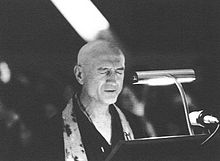Philip Kapleau
Appearance

Rōshi Philip Kapleau (August 20, 1912 – May 6, 2004) was a teacher of Zen Buddhism in the Sanbo Kyodan tradition, a blending of Japanese Sōtō and Rinzai schools.
Quotes
[edit]- The Mahayana stresses the ideal of the bodhisattva, who out of boundless compassion dedicates oneself to helping others. A Zen master, when asked where he would go after he died, replied, "To hell, for that's where help is needed most."
- Zen: Dawn in the West (Garden City, NY: Anchor Books, 1980), p. 83.
To Cherish All Life (1981)
[edit]- Rochester, NY: The Zen Center. Full text online at the Internet Archive.
- To put the flesh of an animal into one's belly makes one an accessory after the fact of its slaughter, simply because if cows, pigs, sheep, fowl, and fish, to mention the most common, were not eaten they would not be killed.
- p. 38
- Every individual who eats flesh food, whether an animal is killed expressly for him or not, is supporting the trade of slaughtering and contributing to the violent deaths of harmless animals.
- p. 55
- Anyone familiar with the numerous accounts of the Buddha's extraordinary compassion and reverence for living beings … could never believe that he would be indifferent to the sufferings of domestic animals caused by their slaughter for food.
- pp. 56-57
- Ultimately the case for shunning animal flesh does not rest on what the Buddha allegedly said or didn't say. What it does rest on is our innate moral goodness, compassion, and pity which, when liberated, lead us to value all forms of life. It is obvious, then, that wilfully to take life, or through the eating of meat indirectly to cause others to kill, runs counter to the deepest instincts of human beings.
- p. 71
- Although one can sympathize with lay persons trying to break their attachment to a diet featuring meat, it is something else again to extend those sympathies to monks, priests, and teachers. What business have these latter to propound the Dharma when they possess neither the perception nor compassion to see the connection between meat eating and the killing of harmless animals, and when they lack the self-discipline to put Buddhist compassion before the pleasures of their palates? What right have they to wear the Buddha's robes when they won't or can't honor the bodhisattvic vows they recite daily to liberate all beings?
- p. 74
External links
[edit]| Modern Buddhist writers 19th century to date | ||
| Theravada / Vipassana movement | B. R. Ambedkar • Ṭhānissaro Bhikkhu • Ajahn Chah • Anagarika Dharmapala • Joseph Goldstein • Henepola Gunaratana • Noah Levine • Nyanaponika Thera | |
| Mahayana | Daisaku Ikeda • Yin Shun • Alfred Bloom | |
| Vajrayana | Pema Chödrön • Kelsang Gyatso • Tenzin Gyatso • Matthieu Ricard • Robert Thurman • Chögyam Trungpa | |
| Zen | Taisen Deshimaru • Thích Nhất Hạnh • Philip Kapleau • D. T. Suzuki • Han Yong-un • Hsing Yun • Sheng Yen | |
| Other and Secular Buddhism | Stephen Batchelor • Robert Wright | |
| Scholars | Lokesh Chandra • Walter Evans-Wentz • Richard Gombrich • Thomas Rhys Davids | |
| Non-Buddhists influenced by Buddhism | Edwin Arnold • Helena Blavatsky • Fritjof Capra • Leonard Cohen • Alexandra David-Néel • Hermann Hesse • Carl Jung • Jon Kabat-Zinn • Friedrich Nietzsche • Henry Steel Olcott • Rajneesh • Helena Roerich • J. D. Salinger • Arthur Schopenhauer • Gary Snyder • Alan Watts • Alfred North Whitehead | |

